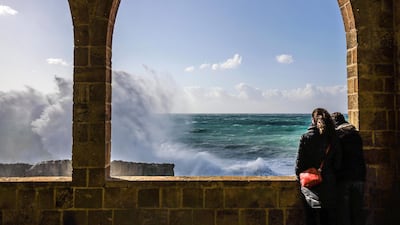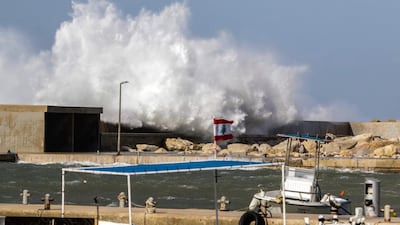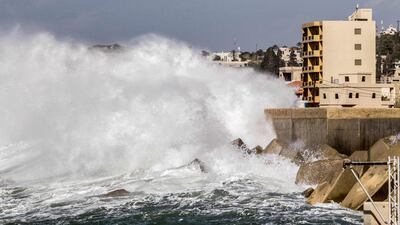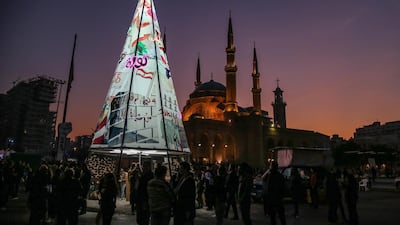Parts of Lebanon were expected to wake up to a white Christmas this year, but in a country that is home to more than a million refugees wintry weather was unlikely to be universally welcomed.
Storm Loulou was expected to bring snow to parts of Lebanon above 1,400 metres overnight, but lower areas will only have rain and high winds, the meteorological department at Beirut’s Rafic Hariri International Airport said.
The officials said the storm could lead to wind speeds of up to 70 kilometres per hour and a raging sea.
"We will have a white Christmas in Lebanon," a representative for the meteorological department told The National on Tuesday.
“The snow will continue until Thursday, so it will be snowing for about two to three days.”
The storm is expected to increase in strength until Thursday and could cause flooding in lower areas of the country due to rain.
The Mount Lebanon range, which runs almost the entire length of the country and has peaks taller than 2,000 metres, will receive the majority of the snowfall.
The Cedars Resort, the oldest ski area in Lebanon, is due to have the most snow this week, at about 76 centimetres.
Webcam footage of Mzaar Ski Resort in Kfardebian, about 50km north-east of Beirut, showed a mostly brown run down to the chair lifts on Tuesday but some of the higher slopes were sprinkled with snow.
The latest snowfall may bring an earlier start to the skiing season in the country, with slopes usually only opening in the new year and running until March or April, depending on conditions.
While the wintry weather may be welcomed by the Lebanese tourism industry, the cold will make life more difficult for the thousands of people living in the country’s refugee camps.
About 1.5 million Syrians live in Lebanon, with most living in camps and substandard accommodation such as unfinished buildings or shacks.
Few of these shelters are well insulated or suitable for the cold months, despite efforts by UN agencies to help refugees to prepare for winter.
Last January, storm Norma brought snow and heavy rain to at least 66 camps, forcing the UN to relocate hundreds of people living there.
Aid groups warned refugees were at risk of freezing to death in the conditions because they had only tents and blankets to defend against the cold.
The weather is unlikely to affect the anti-government protesters in Beirut, with forecasts showing that snowfall is unlikely in the capital or in other coastal areas.
Killing of Qassem Suleimani
ROUTE%20TO%20TITLE
%3Cp%3E%3Cstrong%3ERound%201%3A%3C%2Fstrong%3E%20Beat%20Leolia%20Jeanjean%206-1%2C%206-2%3Cbr%3E%3Cstrong%3ERound%202%3A%20%3C%2Fstrong%3EBeat%20Naomi%20Osaka%207-6%2C%201-6%2C%207-5%3Cbr%3E%3Cstrong%3ERound%203%3A%20%3C%2Fstrong%3EBeat%20Marie%20Bouzkova%206-4%2C%206-2%3Cbr%3E%3Cstrong%3ERound%204%3A%3C%2Fstrong%3E%20Beat%20Anastasia%20Potapova%206-0%2C%206-0%3Cbr%3E%3Cstrong%3EQuarter-final%3A%20%3C%2Fstrong%3EBeat%20Marketa%20Vondrousova%206-0%2C%206-2%3Cbr%3E%3Cstrong%3ESemi-final%3A%20%3C%2Fstrong%3EBeat%20Coco%20Gauff%206-2%2C%206-4%3Cbr%3E%3Cstrong%3EFinal%3A%3C%2Fstrong%3E%20Beat%20Jasmine%20Paolini%206-2%2C%206-2%3C%2Fp%3E%0A
F1 The Movie
Starring: Brad Pitt, Damson Idris, Kerry Condon, Javier Bardem
Director: Joseph Kosinski
Rating: 4/5
Volvo ES90 Specs
Engine: Electric single motor (96kW), twin motor (106kW) and twin motor performance (106kW)
Power: 333hp, 449hp, 680hp
Torque: 480Nm, 670Nm, 870Nm
On sale: Later in 2025 or early 2026, depending on region
Price: Exact regional pricing TBA
Global Fungi Facts
• Scientists estimate there could be as many as 3 million fungal species globally
• Only about 160,000 have been officially described leaving around 90% undiscovered
• Fungi account for roughly 90% of Earth's unknown biodiversity
• Forest fungi help tackle climate change, absorbing up to 36% of global fossil fuel emissions annually and storing around 5 billion tonnes of carbon in the planet's topsoil
MATCH INFO
Real Madrid 3 (Kroos 4', Ramos 30', Marcelo 37')
Eibar 1 (Bigas 60')
Specs
Engine: Electric motor generating 54.2kWh (Cooper SE and Aceman SE), 64.6kW (Countryman All4 SE)
Power: 218hp (Cooper and Aceman), 313hp (Countryman)
Torque: 330Nm (Cooper and Aceman), 494Nm (Countryman)
On sale: Now
Price: From Dh158,000 (Cooper), Dh168,000 (Aceman), Dh190,000 (Countryman)
BIGGEST CYBER SECURITY INCIDENTS IN RECENT TIMES
SolarWinds supply chain attack: Came to light in December 2020 but had taken root for several months, compromising major tech companies, governments and its entities
Microsoft Exchange server exploitation: March 2021; attackers used a vulnerability to steal emails
Kaseya attack: July 2021; ransomware hit perpetrated REvil, resulting in severe downtime for more than 1,000 companies
Log4j breach: December 2021; attackers exploited the Java-written code to inflitrate businesses and governments
Key facilities
- Olympic-size swimming pool with a split bulkhead for multi-use configurations, including water polo and 50m/25m training lanes
- Premier League-standard football pitch
- 400m Olympic running track
- NBA-spec basketball court with auditorium
- 600-seat auditorium
- Spaces for historical and cultural exploration
- An elevated football field that doubles as a helipad
- Specialist robotics and science laboratories
- AR and VR-enabled learning centres
- Disruption Lab and Research Centre for developing entrepreneurial skills
MATCH INFO
Everton 2 (Tosun 9', Doucoure 93')
Rotherham United 1 (Olosunde 56')
Man of the Match Olosunde (Rotherham)
Scorline
Iraq 1-0 UAE
Iraq Hussein 28’




































